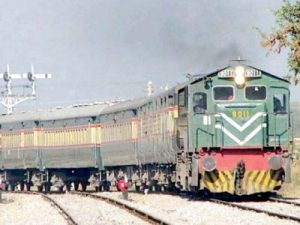ECNEC approves $11.3 billion in CPEC projects.
A government emergency meeting is called before the prime minister travels to China.

In order to present two CPEC infrastructure projects to the Chinese government for expedited implementation during Prime Minister Shehbaz Sharif’s visit, Pakistan hurriedly approved them on Monday at a cost of over $11.3 billion.
The $10 billion Mainline-I project of Pakistan Railways and the $1.3 billion Karachi Circular Railway project were both approved by the Executive Committee of the National Economic Council (Ecnec). Since there was no Ecnec meeting scheduled for Monday, it was an emergency gathering.
Due to the lack of appropriate preparation before the meeting, the committee approved both schemes “in principle”. Hours before PM Shehbaz Sharif’s trip to China, Ecnec met. Ishaq Dar, minister of finance, presided over the meeting.
The ML-I project’s cost increase of 45% to approximately $10 billion was approved in principle by Ecnec. The project was years behind schedule because China declined to give money at the earlier agreed-upon cost of $6.8 billion.
Planning Minister Ahsan Iqbal recently urged China to expedite the ML-I project’s processing since failing to do so will cause the main railway network to collapse within a year.
According to a statement from the Ministry of Finance, “Ecnec considered and approved, in principle, the Ministry of Railways’ modified PC-1 for upgrading the existing Mainline-1 (ML-1) project of Pakistan Railways at a cost of $9.85 billion subject to the recommendation of cost, technical details, and preferably an equity participation financial model.”
The ML-I project was given the green light last week by the Central Development Working Party (CDWP), the first tier for approving large-scale development plans.
The CDWP gave a number of directives while approving the project, the largest CPEC program, however, they were mostly ignored.
The Ministry of Railways was directed by CDWP to create a project monitoring and implementation unit to carry out and oversee the project. Before presenting a summary to Ecnec, it was said that the rise in cost from $6.8 billion to $9.9 billion should be reviewed by a third-party consultant, and the Ministry of Railways should submit the verified cost.
In order to make the work packages more realistic and feasible, the CDWP also issued guidelines allowing the Ministry of Railways to assess the project’s packaging and phasing and make intra-packing adjustments in conjunction with the Chinese.
A copy of the previously created Pakistan Railways Strategic Plan (PRSP) as well as an updated business plan would also be presented, the Ministry of Railways stated.
It will offer a thorough blueprint for the eventual conversion of the current system into an electric traction system.
Due to the decision to hold an emergency meeting and accept the largest-ever project, which entails a $8.4 billion Chinese loan, these specifics are yet unknown. Due to Beijing’s refusal to offer financing up to 90%, Pakistan has cut China’s financing contribution from 90% to 85%.
The project’s price tag is astonishing at Rs2 trillion in rupees. The ML-I project’s cost in terms of rupees grew numerous times as a result of the Pakistan Tehreek-e-Insaf (PTI) government’s incompetence, according to Finance Minister Ishaq Dar on Wednesday.
Nearly two weeks prior to PM Shehbaz Sharif’s trip to China, CDWP provided their assent. The premier will ask China’s National Railway Administration for permission before opening the project’s bidding process.
Islamabad is eager to hold the project’s groundbreaking ceremony on March 23, 2023.
According to a representative of the Ministry of Planning, Pakistan will suggest that a joint memorandum be signed during the PM’s visit, outlining the dates of project milestones.
A 1,733 km long route will be renovated as part of the project, and 482 underpasses, 53 flyovers, 130 biker bridges, and 130 stations will be built along the way.
The ML-I route travels from Karachi to Peshawar through Kotri/Hyderabad, Rohri, Multan, Lahore, and Rawalpindi.
The Ministry of Railways had utilised an exchange rate of Rs200 to a dollar that was four months old, thus even the approximate cost of $10 billion was underestimated. The project cost is overstated by Rs190 billion, or around $856 million, at the current currency rate.
The China-funded KCR project was also approved by Ecnec at a cost of Rs 292.4 billion, which was 44% more than the original projection. The price includes a Rs263 billion ($1.2 billion) loan from China.
The project’s financial structure, which relies on public-private partnerships (PPPs), was approved by the previous PTI administration. But the current coalition administration chose to borrow $1.1 billion from China instead to carry out the project in the same manner as the Lahore Orange Metro Line.
The project is funded by the government of Sindh, and the province government will cover all local costs. The federal government won’t contribute any money.










































